Blue Velvet
Blue Velvet
After the success of his song "Blue on Blue" (#3 in mid-1963), Vinton decided to record an album of "Blue" songs ("Blue Moon," "Blue Hawaii," "Am I Blue," etc). As he was picking up sheet music in Nashville, Vinton received a gift from publisher Al Gallico: a copy of "Blue Velvet," which in 1951 was the last major hit for Tony Bennett. The song fit very well with Vinton's project, as every song on the album had "Blue" in the title.
Blue Velvet
‘Blue Velvet’ is a popular song, written by Bernie Wayne and Lee Morris.
Bernie Wayne, composer and lyricist: born Paterson, New Jersey 1919; died Marina del Rey, California 18 April 1993. 'Blue Velvet' was more than an annuity; it was the high-point of a career during which he wrote for such diverse artists as Elvis Presley (for the film Viva Las Vegas, 1964) and the Bowery Boys (Blues Busters).
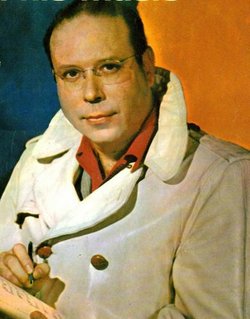
Bernie Wayne
In the 1940s Wayne began a songwriting partnership with the lyricist Ben Raleigh. In 1946 they wrote 'Laughing on the Outside (Crying on the Inside)'. It was introduced by the syrupy Sammy Kaye orchestra, complete with cornball laughing/crying saxophones. Dinah Shore's torchy Columbia recording made the song famous.

Bobby Vinton
Bernie Wayne songs seem to have the knack of turning up in cult films. In 1949 'Laughing on the Outside' was used in the celebrated low-budget thriller Gun Crazy. Made 18 years before Bonnie and Clyde and clearly influencing it.
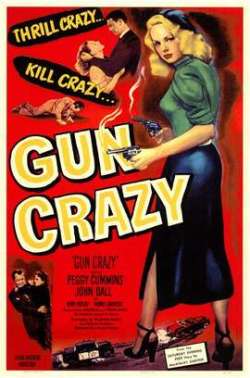
Gun Crazy, poster
In 1950 came 'Blue Velvet'. Written in collaboration with Lee Morris, a writer of television commercial jingles and nightclub revues. The first public performance of the song was by singer Ray Mason in 1950 at a fashion show in Boston.
In 1951 the ballad was recorded by Anthony Dominick Benedetto shortly after he became Tony Bennett. It peaked at #16 on the Billboard Best Selling Pop Singles Chart (the predecessor of the Billboard Hot 100).
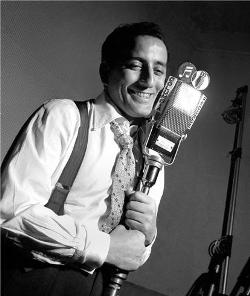
Tony Bennet, 1950
A 1955 version of the song by The Clovers reached #14 on the Billboard Rhythm & Blues chart.
In 1963 it was revived by Bobby Vinton, with Burt Bacharach arranging and conducting. A million-seller, the record was No 1 in the United States for three weeks.
The following year Kenneth Anger used it on the soundtrack of Scorpio Rising, his much-banned avant-garde study of homosexual motorcycle gangs.
In 1986 David Lynch wrote and directed the equally controversial film Blue Velvet.
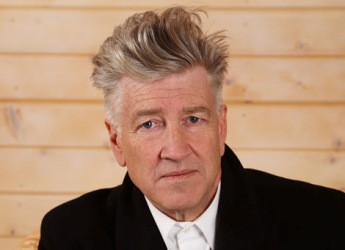
David Lynch
This song had a prominent role - it was used in a gruesome scene where we discover a human ear that had been cut off someone's head. The song (sung by Vinton off screen and by Isabella Rossellini on screen) completely contradicted the mood of the scene, which apparently was the point.
The movie brought the song to a new audience, although it was now associated with a severed ear.
Entertainment Weekly ranked Blue Velvet's soundtrack on its list of the 100 Greatest Film Soundtracks. Critic John Alexander wrote, "the haunting soundtrack accompanies the title credits, then weaves through the narrative, accentuating the noir mood of the film."
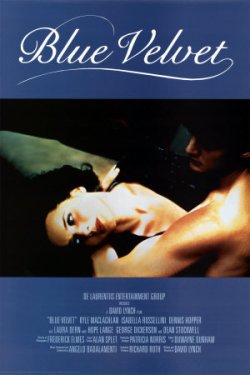
Blue Velvet, poster
Blue Velvet, Lyrics:
She wore blue velvet Bluer than velvet was the night Softer than satin was the light From the stars She wore blue velvet Bluer than velvet were her eyes Warmer than May her tender sighs Love was ours Ours, the love I held tightly Feeling the rapture grow Like a flame burning brightly But when she left Gone was the glow of blue velvet *But in my heart there'll always be Precious and warm the memory Through the years And I still can see blue velvet Through my tears
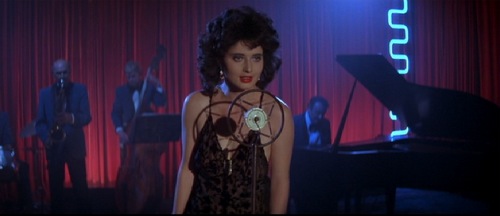
Isabella Rossellini sings Blue Velvet
Last Updated (Sunday, 15 March 2015 13:37)








